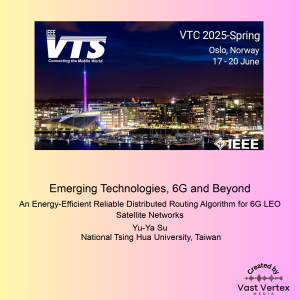

VTC 2025 Spring Conference’s Shorts
An Energy-Efficient Reliable Distributed Routing Algorithm for 6G LEO Satellite Networks
2025-06-13
Low Earth Orbit (LEO) satellite networks, known for their low signal latency, are ideal for 6G real-time communications and Internet access. However, they are confronted with considerable challenges, including instability and restricted power resources. It is importance to guarantee reliable and energy-efficient operations in order to maintain uninterrupted and high-quality service. We propose an Energy-Efficient Reliable Distributed Routing Algorithm (EERRA) that dynamically updates satellite...
Low Earth Orbit (LEO) satellite networks, known for their low signal latency, are ideal for 6G real-time communications and Internet access. However, they are confronted with considerable challenges, including instability and restricted power resources. It is importance to guarantee reliable and energy-efficient operations in order to maintain uninterrupted and high-quality service. We propose an Energy-Efficient Reliable Distributed Routing Algorithm (EERRA) that dynamically updates satellite information, prevents data loops, and optimizes transmission paths to avoid eclipse regions. This approach extends satellite lifetime and improves network performance. The simulation results show that EERRA outperforms existing algorithms, including Global, DRA, and DSRA, across multiple metrics. EERRA demonstrates exceptional performance in terms of average end-to-end delay, average hop count, signaling overhead, and satellite lifespan. Compared to DRA and DSRA, EERRA achieves lower average end-to-end delay and hop count, and significantly reduces signaling overhead compared to the Global algorithm. Furthermore, EERRA excels in maintaining the highest average residual energy and the lowest life cycle consumption. These attributes make EERRA a highly efficient solution for managing the complex dynamics of LEO satellite networks, ensuring sustainable and reliable network operations over extended periods.
An Energy-Efficient Reliable Distributed Routing Algorithm for 6G LEO Satellite Networks
Yu-Ya Su, National Tsing Hua University, Taiwan; Shun-Ren Yang, National Tsing Hua University; Chai-Hien Gan, Information and Communications Research Laboratories, ITRI; Phone Lin, Xizhe Qiu, National Taiwan University
View more
An Energy-Efficient Reliable Distributed Routing Algorithm for 6G LEO Satellite Networks
Yu-Ya Su, National Tsing Hua University, Taiwan; Shun-Ren Yang, National Tsing Hua University; Chai-Hien Gan, Information and Communications Research Laboratories, ITRI; Phone Lin, Xizhe Qiu, National Taiwan University
Comments (3)


